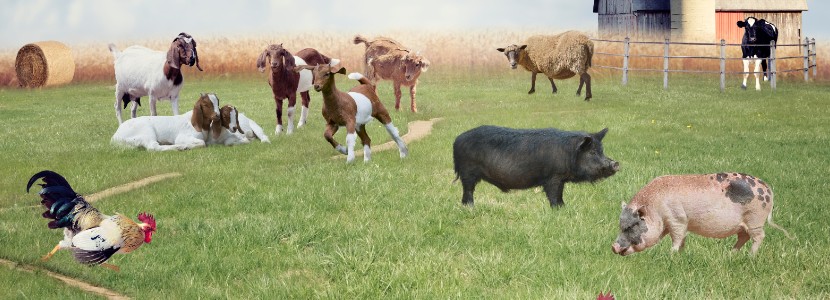Natural antioxidants and their application in animal nutrition presents itself as promising and necessary under current productive conditions. Oxidative stress is an imbalance between production and neutralization of free radicals by antioxidant defense mechanisms. Low quantities of reactive oxygen species (ROS) are necessary for the organism’s physiological functions. However, when these substances are found in excess, they cause oxidative damage in several molecules which impacts DNA and cellular proteins negatively, as well as causing lipid peroxidation of cell membranes (Rahal et al. , 2014).
In production animals there is a well established correlation between the onset of certain diseases and the reduction of antioxidant status. Oxidative stress is also implicated in many pathological disorders that affect:
- health
- well-being
- and the productive parameters of animals
In fact, in certain productive stages, animals face physiological changes like birth and lactation, or environmental changes, such as weaning or environmental temperature which generate stress. This in turn results in a diminished antioxidant status (Rossi et al. , 2009).
A good antioxidant status in animals can also positively affect meat quality parameters, improving vitamin E content while reducing lipid peroxidation. |
Now more than ever, consumers tend to look for products of animal origin which are considered as safe and natural products. Therefore, it is imperative for producers to replace synthetic substances used for production purposes, with natural ones. As a result, several recent studies have been focused on finding natural alternatives to synthetic antioxidants for their use as animal feed additives.
The effects of natural extracts on product quality, oxidative stability and shelf life in ruminants, pigs and rabbits have been previously reviewed by several authors. They have reported that the effects of plant additives are different but similar to those of synthetic vitamin E, suggesting their role as possible natural substitutes (Tsiplakou et al. , 2021).
- However, it is important to determine the right dosage for the different extracts in order to avoid problems like lower feed digestibility and negative impacts on intestinal morphology.
A positive influence on oxidative stability, sensory characteristics and fatty acid composition of poultry meat has also been observed with the inclusion of plant extracts within poultry diets. This supports the partial substitution of synthetic antioxidants in animal diets (See “Stevia an effective natural additive in poultry?” )
- Authors noted that some studies reported that dietary supplementation with extracts of Salix spp. bark. in heat-stressed broilers reduced oxidative stress markers and enteropathogenic bacteria. Improving the growth performance of the animals as a result(Saracila et al., 2021).
Another study, conducted on broilers exposed to heat stress, showed that dietary supplementation with astaxanthin , a carotenoid derived from the yeast Phaffia rhodozyma, improved:
- Antioxidant status
- Immune response
- Meat quality (Hosseindoust et al., 2020).
The work of Parraguez et al. (2021) reports that dietary supplementation with natural extracts containing polyphenols in pregnant sows increased the number of live birth piglets and litter weight, reducing the presence of piglets with low birth weights.
- In addition, piglets born to sows that received polyphenols had a higher antioxidant status and tended to have higher weaning weights compared to those in the control group.
- This data underlines the importance of antioxidant status for the productive performance of sows and piglets.
Corino et al. (2021) evaluated the effects of various plant extracts on antioxidant status and reserves in weaned piglets using the Kit Radicaux Libres (KRLTM) test.
- This test helps quantify the body’s antioxidant reserve, which can be deployed to reduce the organism’s oxidative stress.
Mixtures of plant extracts and Boswellia were found to maintain the antioxidant status of the blood, while extracts of Uncaria and Tanacetum are mainly converted into blood reserves in the form of glucuronides, sulfates and glycosides.
It is interesting to highlight how different phenolic compounds play different roles within the organism, and this should be linked to phenolic metabolism and its relationship with the gut microbiome.
Marino et al. (2021) investigated the dietary inclusion of hazelnut husk in dairy sheep. This is a by-product of the chocolate industry which is rich in phenolic compounds. Data revealed that cheese obtained from sheep which were supplemented with hazelnut peel presented a healthier lipid profile and a higher tocopherol content.
Researchers also investigated the effects of sesame flour inclusion in the diet of goats within their mid-lactation period. They found this to be a valuable strategy to reduce oxidative stress markers and increase the oxidative stability of milk.
- Sesame flour in combination with synthetic antioxidants (vitamin E and selenium) had a negative effect on antioxidant status.
This study highlighted the fact that excessive consumption of synthetic antioxidants such as vitamin E and selenium can lead to what is known as “antioxidant stress”, causing harmful effects to the organism (Tsiplakou et al., 2021).
- However, a study on the inclusion of hydroxy-selenomethionine, a chemically synthesized organic form of selenium in the diet of Charolaise bulls, has shown improvements in meat quality parameters (Grossi et al., 2021).
Conclusions
Dietary antioxidant supplementation in cattle has been shown to play a beneficial role in the improvement of antioxidant status and animal health. It also improves product quality by protecting them from oxidation and improving their nutritional value.
It is still necessary for more research to be carried out on this subject, to have a better understanding of the health benefits associated to dietary antioxidants in livestock. Highlighting the importance of determining the appropriate dosage of such compounds for antioxidant stress prevention.
Source: Abstract taken and modified from “Antioxidants in Animal Nutrition.” Corino y Eossi, 2021
[/register]
